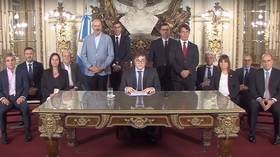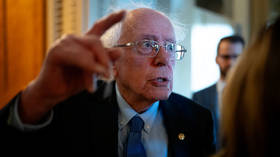Latin American leader mulls plan to force through radical reforms

Newly inaugurated Argentine President Javier Milei is “on the warpath” against the National Congress and could put pressure on the legislature by holding public votes on policy proposals, La Nacion reported on Wednesday.
Referring to a major economic reform that his cabinet presented earlier this month, Milei told La Nacion: “If they [the Congress] reject it, I would call for a plebiscite and have them explain to me why they are against the people.”
The proposed legislation would impose a two-year state of emergency, deregulate the economy, privatize state property, and alter the national healthcare system, among other changes.
Argentine law allows for both binding and non-binding referendums, termed “public consultations”, although only the National Congress can initiate a binding one. If a non-binding proposal by the executive branch is approved in a plebiscite, the parliament is obliged to consider it.
“They cannot accept that they lost, that the population chose something else,” Milei said of the opposition in the National Congress. He claimed some lawmakers were “seeking bribes,” but did not provide details to back up the allegation.
One example of a non-binding referendum in Argentina was in 1984, when a vote was called on the government’s plan to resolve a border dispute with Chile. Overwhelming public support subsequently put pressure on the opposition in the Congress.
Milei, a libertarian economist and former MP, was considered a dark horse in Argentina’s presidential election last month. He was voted in on a promise to generate economic growth through radical public spending cuts and liberalization. Argentina is suffering high levels of inflation, which Milei has vowed to address through “shock therapy.”
The new president has claimed that opponents of his plans are experiencing “Stockholm syndrome,” and has vowed a harsh crackdown under his government.
In the same interview with La Nacion, Milei confirmed that he wants to introduce 20,000 and 50,000 peso bills. The largest note is currently 2,000 pesos, although inflation has wiped much of the value off the national currency over the years. Keeping wads of cash is “torture” for Argentines and “puts a label saying ‘steal here’” on those carrying larger sums, Milei argued.













